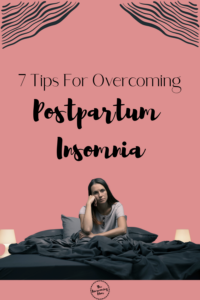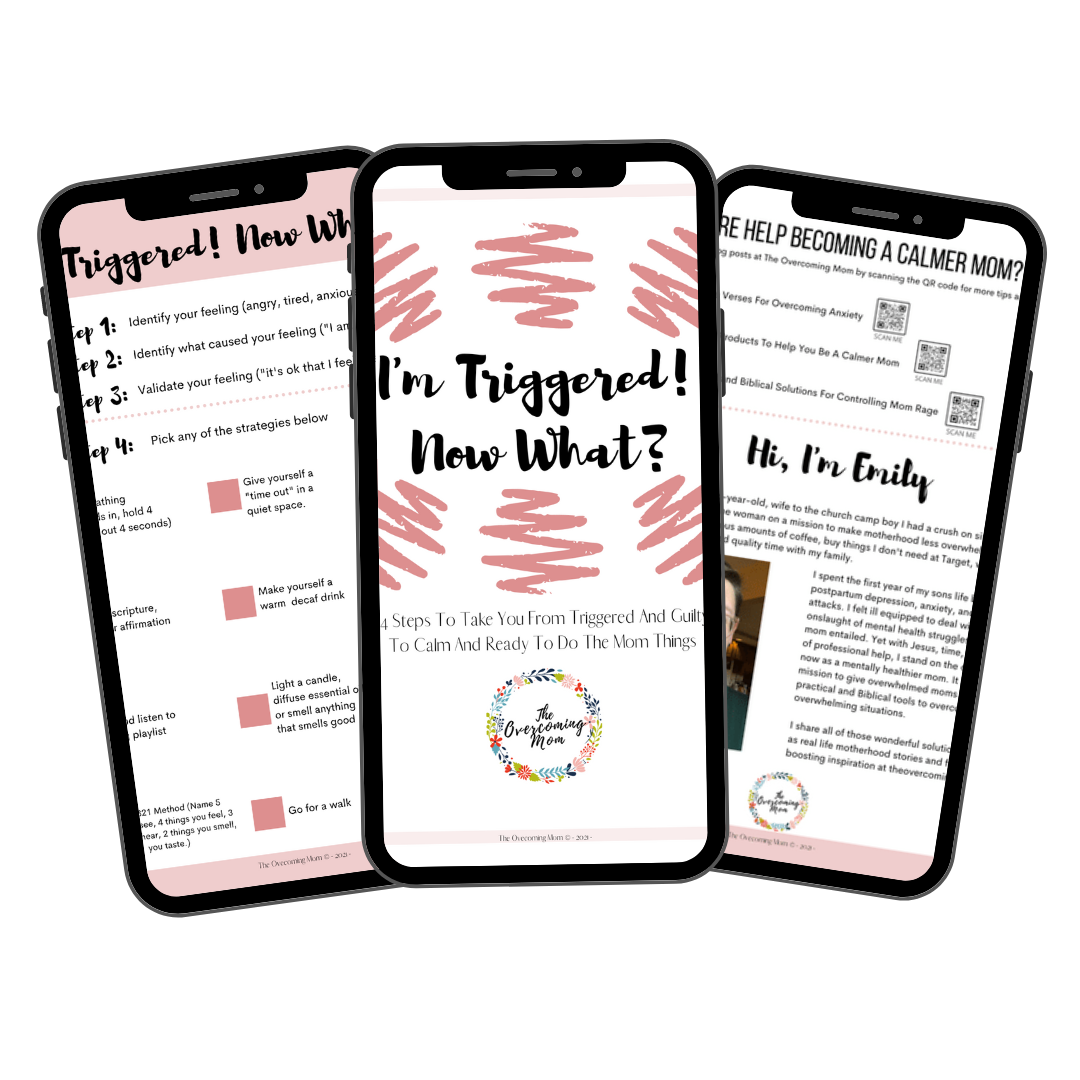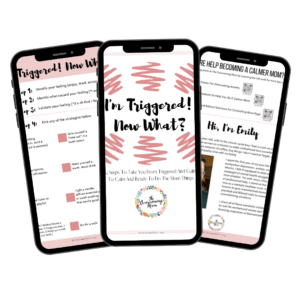This page may contain affiliate links. As an Amazon Associate I earn from qualifying purchases. If you want more information, please see my Affiliate Disclosure.

After having my child, I expected I would be exhausted. I knew I’d be waking up at odd hours, and sleeping less than usual. What I didn’t expect was that even when my child was sleeping, I couldn’t! I spent many nights staring at my baby monitor wondering why my child slept better than I did. What I was experiencing was postpartum insomnia.
When I turned to the internet for help with postpartum insomnia, I came up blank. I encountered lots of moms struggling to stay awake, but not as many with the opposite problem. I needed answers, and I needed them desperately. Through research and personal experience, I’m giving you the best tips I got for curbing postpartum insomnia. But first…what is it?
What Is Postpartum Insomnia
According to the American Academy of Sleep Medicine, insomnia is defined as difficulty either falling or staying asleep that is accompanied by daytime impairments related to those sleep troubles. Postpartum insomnia is typically labeled as a kind of short-term insomnia happening after giving birth, unless it goes on for longer, then it would be considered chronic.
Insomnia in general is extremely frustrating, but even more so during the postpartum period. Having a newborn alone disrupts average sleep patterns, but imagine struggling to sleep even when baby is sleeping. Postpartum insomnia is more common than you’d think. Studies have shown that 40-60% of postpartum moms experience insomnia (Sivertsen, B., Hysing, M., Dørheim, S.K. et al., 2015). Postpartum insomnia is often a precursor to postpartum depression as well.
After having a baby, many new mothers find themselves feeling exhausted during the day, but unable to sleep at night. Postpartum insomnia can be frustrating and make it difficult to cope with the demands of motherhood. However, there are some things you can do to overcome this problem. Here are 7 tips for overcoming postpartum insomnia.


Focus More On “rest” than “sleep”
If you’re reading this, it probably means that you have had at least a few nights of laying in your bed begging your body to fall asleep, but you’re still staring at the ceiling wondering why your child sleeps better at night than you. Focusing heavily on the goal of actually falling asleep can actually stress yourself out more, therefore keeping you from falling asleep. Instead of spending your efforts on getting the adequate hours of rest, focus on allowing your body time to rest.
At night when you’re struggling to fall back asleep after a night time wake up, don’t fight yourself in your bed to fall back asleep. Take a rest on the couch, journal, make tea, or do something else that feels restful and restorative. At some point, you will feel the urge to actually sleep. But your body may just need time to wind down after being awaken in the middle of the night.
Get some exercise
Toting around kids often feels like all the exercise we need, but our bodies were made to exert energy. Just like kids, we have energy reserves that need to be burned in order for us to feel adequately tired when it’s time to sleep. Making regular time for exercise can help reset our bodies to a normal sleep-wake pattern.
Make it something simple and sustainable. Maybe a walk around the neighborhood, a workout video, yoga class, or a favorite sport. Whatever it is that burns off excess energy and makes your body ready for sleep.
Related: How to Handle Sleep Deprivation After Baby Arrives
establish a bedtime routine
We spend lots of time in motherhood preaching good bedtime routines for babies, but what about moms? I’m sure your typical wind-down routine becomes completely jacked up thanks to your new bundle of joy. The shake-up of your typical bedtime routine can mess with your sleep way more than you would think.
Just like how we establish a restful, relaxing bedtime routine for our kids, give one to yourself too. Following a predictable pattern right before bedtime signals your brain that it’s time to sleep. Which is exactly what you need when you’re struggling with postpartum insomnia.
Cut out Or Limit caffeine
As someone who is a MASSIVE coffee fan, being told to limit caffeine can feel like being asked to breathe less. But hear me out. Caffeine is a stimulant, meant to keep you awake. It dims your body’s ability to sense its need for sleep. Our extreme exhaustion after having a baby usually leads us to consume more caffeine than we would under normal circumstances. That excessive caffeine intake can make insomnia substantially worse.
Some people may not need to completely cut out caffeine, but mimic your normal caffeine consumption pre-baby. Some people may be able to achieve some kind of a placebo effect for caffeine by drinking decaf or half-caff beverages. Regardless of how you choose to go about it, minding your caffeine intake can positively improve postpartum insomnia.
Maybe don’t “sleep when the baby sleeps”
I know everyone and their mom, dad, brother, and sister tells new moms to “sleep when the baby sleeps.” But if you’re struggling with postpartum insomnia, this may hurt you more than help.
Having a baby and waking up at strange times in the day can cause our bodies natural sleep-wake cycle to get messed up. In order for us to restore some of that natural order, we need to sleep more like an adult and less like a baby. Of course, a nap during the day can definitely help with getting you to night time, but excessive napping can keep you from getting restorative sleep at night. Depending on your personal sleep needs, plan to either not nap at all, or only nap once during the day, focusing your restorative sleep at night.
Instead of literally sleeping when the baby sleeps, try simply resting. Even giving your body a slight break while baby naps can help you achieve some relaxation for bedtime.
Limit screen time
Blue light from screens has been shown to effect your bodies ability to produce melatonin (read more about it here). Being woken up at random hours by a baby can mess with your circadian rhythm anyways, but throwing the effects of blue light in the mix can make your sleep problems even worse.
Long before the days of screens and clocks, we used the sun to tell us when it was time to be awake and time to sleep. Our bodies have been hard wired to follow that natural rhythm. Blue light from screens can make our body feel like it should be awake, when it should actually be asleep.
Many experts recommend turning off screens 2-3 hours before bedtime. Doing so can help reestablish your bodies circadian rhythm. Instead of scrolling Instagram to help you sleep, try reading a book, or drawing, or some other relaxing activity to wind down.
Don’t Shy Away From Asking For Help (even if it’s hired help)
There is a plethora ways you can get outside help for postpartum insomnia. Whether that be from friends and family, a postpartum doula, a sleep consultant (they don’t just exist for babies, but adults too), or your doctor, getting help may be necessary if it’s effecting your every day life.
Before our modern times, it was common for mothers to have a literal village of other community members that would assist with every day life after their baby was born. Though many of us don’t have that literal village anymore, it doesn’t mean we can’t create one. Whether your village is local family or friends, or professionals. Some mothers struggling with postpartum insomnia may need some form of medical assistance to cope.
If you’re struggling with additional sleep issues, such as nodding off during undesired times, having delayed reaction times, having continuous issues with falling asleep, not waking when your baby wakes up, snoring, or having postpartum depression symptoms, then professional help may be necessary.
Resources For Coping With Postpartum Insomnia
Postpartum insomnia can be a scary thing to deal with. You don’t have to deal with it alone. Below are some resources for how you can get help for postpartum insomnia.
- U.S. Department of Health And Human Services Office of Women’s Health has a helpline for women experiencing postpartum depression and other mental health disorders. his number can be reached at 1-800-994-9662 between 9 am and 6 pm Eastern Standard Time, Monday to Friday.
- “Insomnia Coach” is an app developed by the U.S. Department of Veteran affairs to help veterans manage insomnia symptoms. Anyone can use it, and it’s free. Insomnia coach is basically like a sleep coach in your pocket. I used it during my postpartum insomnia struggle, and it helped tremendously!
- Postpartum Support International has a plethora of resources for moms. Their website has an unbelievable amount of beneficial information, and they have a helpline that can be reached at 1-800-944-4773. You can also text “HELP” to 800-944-4773 .










